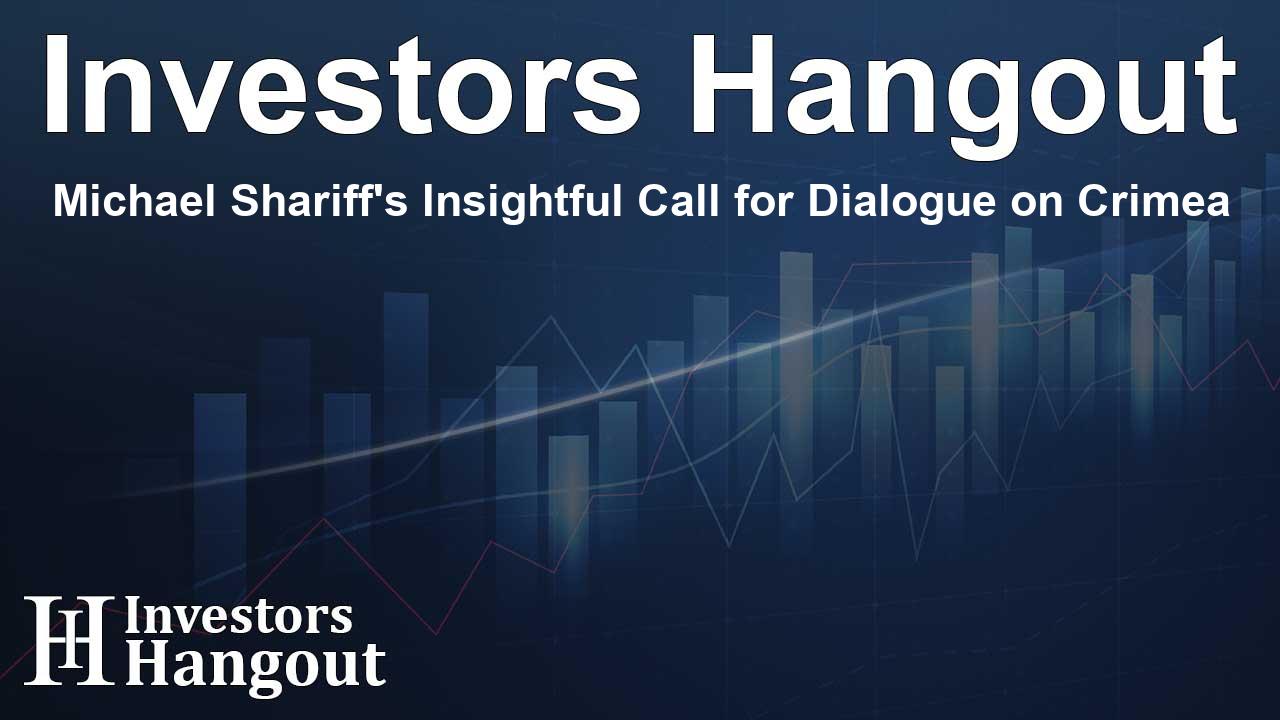Michael Shariff's Insightful Call for Dialogue on Crimea

Michael Shariff's Insightful Call for Dialogue on Crimea
Michael Shariff, a Michigan-based attorney, has shared a profound personal essay that explores the need for genuine discourse regarding the relationship between Russia and Ukraine. His essay, published on the Russia-America Friendship Society website, is titled "Crimea and the Path to Peace: A Personal Reflection on the Ukraine-Russia Conflict." In this piece, Shariff articulates a strong desire for peace and emphasizes the necessity of nuanced conversation.
In his essay, Shariff expresses, "As someone who yearns deeply for peace between Russia and Ukraine, I believe that honest and nuanced conversation is long overdue." This sentiment reflects a growing call for understanding and dialogue in the face of ongoing geopolitical tensions.
The Importance of Historical Context
Shariff dives into the historical context surrounding the Crimea conflict, noting an important referendum that took place before the dissolution of the Soviet Union. He recounts that on January 20, 1991, a nationwide referendum occurred in Crimea with the question regarding the restoration of the Crimean Autonomous Soviet Socialist Republic. Remarkably, over 93% of Crimeans voted in favor of this proposal, a fact that Shariff highlights as critical in understanding Crimea's legal status.
Following the referendum, on February 12, 1991, the Supreme Council of the Ukrainian SSR officially restored Crimea's status, thus marking a significant step in Crimea's quest for autonomy. Later that year, on December 1, 1991, during a nationwide Ukrainian independence referendum, Crimea faced challenges. The independence vote failed to meet the required two-thirds majority, granting Crimea the opportunity to determine its sovereignty in accordance with the USSR's legal framework.
Navigating Legal Complexities
Shariff passionately argues that the political decisions rendered regarding Crimea were embedded within a complex legal tapestry. He insists that at that moment, Ukraine possessed no authority to annul these rights. References to Ukraine's Constitution support this assertion, which clearly states that new laws cannot undermine existing rights.
This perspective underscores the assertion that Crimea should have retained its status as a sovereign entity following the referendum. Shariff notes that shortly afterward, between February and May 1992, Crimea's Parliament acted on its rights, declaring state sovereignty, adopting its first constitution, and preparing for an independence referendum.
Despite these decisions being consistent with recognized rights, the Ukrainian government responded forcefully, nullifying Crimea’s political aspirations without adhering to legal processes. This forced approach triggered ongoing tensions and resistance from Crimeans who continued to seek greater autonomy.
Resilience Amidst Adversity
In 1994, amidst growing frustrations, Crimean officials organized a referendum aimed at expanding autonomy and even elected a President of Crimea. The overwhelming support from citizens highlighted the community's desire for self-governance. However, the Ukrainian capital responded with military force, ultimately leading to violent confrontations and a greater suppression of Crimean aspirations.
Shariff recounts a significant event that transpired on the night of March 16-17, 1995, when an elite SBU unit stormed the Crimean Parliament. This incident symbolized the serious repression of Crimean autonomy, culminating in the annulment of Crimea's Constitution and the premature termination of the presidency. The repercussions of these actions contribute to the current landscape of conflict and tension.
Shariff concludes with a poignant reflection on the ongoing human costs associated with the conflict. He states, "There is no denying the tragic human cost of the ongoing conflict—on both sides. Countless lives have been lost, families displaced, and infrastructure destroyed." His words resonate with the urgency of understanding the conflict's historical roots amidst the devastation felt by many.
Frequently Asked Questions
What is the main argument presented by Michael Shariff?
Michael Shariff emphasizes the need for honest, nuanced dialogue about the Russia-Ukraine conflict, highlighting the historical context of Crimea's status.
What important historical event does Shariff discuss in his essay?
Shariff discusses the January 1991 referendum in Crimea where a significant majority supported restoring Crimea as an autonomous region.
How does Shariff interpret Ukraine's legal authority regarding Crimea?
He argues that Ukraine lacked the legal authority to negate Crimea's right to self-determination following the 1991 referendum.
What were the consequences of the 1995 storming of the Crimean Parliament?
This event marked a severe repression of the Crimean Parliament’s autonomy efforts and led to the annulment of the Crimean Constitution.
What does Shariff highlight about the humanitarian impact of the conflict?
He underscores the tragic human costs associated with the conflict, affecting lives and displacing families, which remain poorly understood.
About The Author
Contact Dominic Sanders privately here. Or send an email with ATTN: Dominic Sanders as the subject to contact@investorshangout.com.
About Investors Hangout
Investors Hangout is a leading online stock forum for financial discussion and learning, offering a wide range of free tools and resources. It draws in traders of all levels, who exchange market knowledge, investigate trading tactics, and keep an eye on industry developments in real time. Featuring financial articles, stock message boards, quotes, charts, company profiles, and live news updates. Through cooperative learning and a wealth of informational resources, it helps users from novices creating their first portfolios to experts honing their techniques. Join Investors Hangout today: https://investorshangout.com/
The content of this article is based on factual, publicly available information and does not represent legal, financial, or investment advice. Investors Hangout does not offer financial advice, and the author is not a licensed financial advisor. Consult a qualified advisor before making any financial or investment decisions based on this article. This article should not be considered advice to purchase, sell, or hold any securities or other investments. If any of the material provided here is inaccurate, please contact us for corrections.
